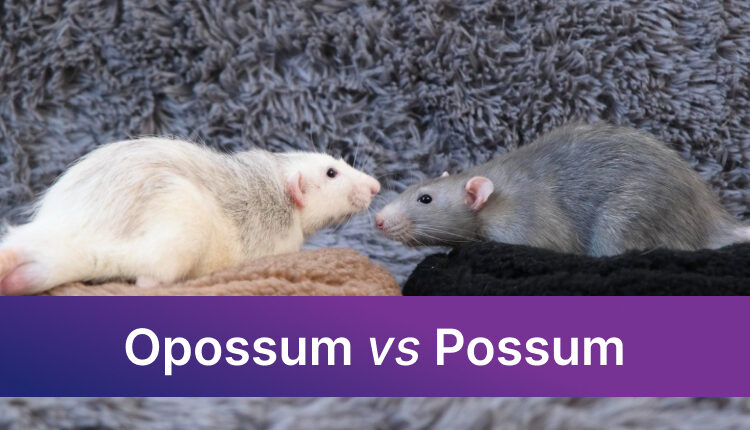In reality, when most think of the weird world of marsupials, the names opossum and possum are often used interchangeably. These two names look so similar, yet they are actually referencing separate families of animals living in other regions.
If you’re curious about the nuances that separate them or just want to learn more about these incredible animals, then you’ve come to the right place! Let’s get into the nitty-gritty of opossum vs possum and unravel this mystery of wildlife together.
Opossum vs. Possum – What is the meaning?
If you glance cursory, opossums and possums might look pretty similar. And they are marsupials. But there are some crucial differences between these two marsupials.
First of all, opossums are natives of the Americas, whereas possums primarily inhabit Australia and its surrounding islands.
To distinguish between the two species, look for the pointed snout and hairless tails of opossums. In the meanwhile, possums mostly sport plush fur and flat faces. Their habitats also differ significantly, depending on geography.
And behaviorally, these animals also differ. Opossums become quite famous for their propensity to play dead at the approach of danger. Possums, on the other hand tend to try and scamper up a tree or shrub and hide. Once you learn these differences, you may marvel at these creatures all the more.
What’s the Difference? Possum vs. Opossum
So often, the words “possum” and “opossum” are confused with each other, and although they are pronounced the same, they actually refer to two different animals. The term “opossum” refers specifically to the ones native to the Americas, and “possums” particularly include the Australian species and its neighbors.
An opossum belongs to the family Didelphimorphia, which carries features such as a long snout and a prehensile tail. These are an opossum’s features and have a distinctive grayish-white coloration with bare tails that aid them in balancing on trees.
Possums belong to many families within the suborder Phalangeriformes. They are often described as fuzzy with rounded faces, having a fur-covered tail. These are differences which result from their unique traits in different environments.
Origin of ‘(O)possum’
The term “possum” comes from the Algonquin, meaning “white animal.” This mirrors the iconic light fur of the beast. People of the various indigenous tribes long before the Europeans discovered the land used the name.
When Europeans began colonizing America, they made the word “opossum.” They used this term throughout North America. Meanwhile, in Australia and other regions nearby, a different group of marsupials was also called “possum.”
Opossums and possums might be cousins, but they have come from different families within the marsupial order. The differentiation in pronunciation shows just how language changes with culture and geography.
Pronunciation of ‘Opossum’
The word ‘opossum’ sometimes proves troublesome to pronounce. It’s actually pronounced as oh-POS-sum, with the emphasis on the second syllable. Many people drop the ‘o’ at the beginning and pronounce the word simply as “possum.”
Whereas that is a common variant in informal speech, the complete word is used to honor the word’s heritage and characteristics.
It is a cruel fate that this name of this creature is from the tongue of Native Americans. So if you ever want to show off to your friends or educate other enthusiasts about wildlife, be sure to pronounce it correctly-the way Mother Nature intended for it to be pronounced.
When to use opossum?
The term of art is “opossum” if referring to one of the specific, native North American animals. That particular marsupial is unique in its appearance as well as its various behaviors.
Generalizing to the great broad family of marsupials found in Australia and New Guinea, you use the term “possum.” These guys and gals look nothing at all like the North American cousins, both in appearance as well as habitat.
Contextual provision will decide which of these terms to be used. In any wild discourse or learning environment, there is much of the need to be precise to remove confusions from the unacquainted audiences with the details that differentiate these animals.
Where Can You Find a Possum?
Possums are mainly found in Australia and New Guinea, where they usually do well in many varieties of settings. Though they appear to really love dense forests and woodland environments, they also live well in the midst of cities, especially if there are abundant trees for cover. These versatile animals may be seen roaming around gardens or parks in search of food.
Unlike their cousins in Australia, North American opossums dwell on whatever landscape is given in their part of the continent: you will find them ambling through woods and swamplands and even marching into your neighborhood subdivision. This versatility ensures that they can survive near human habitations.
Possums as well as opossums, contribute wonderfully to their ecosystems as a means of killing insects and other pests and cleaning up carrion. It can be fun seeing these marsupials go about their business!
Frequently Asked Questions
We find so much confusion while talking about the terms opossum and possum. People have so many questions regarding the difference between them, habits, and habitats. Here are some questions that brief the interesting variety.
FAQ's
The most obvious distinction lies in the species. An opossum is a member of the order Didelphimorphia of the Americas, and the term possum refers to several species of marsupials that live mainly in Australia and surrounding islands.
Yes! Both have an interesting defense mechanism known as "playing possum," where they play dead to shoo off predators.
As a whole, opossums are very inoffensive and may even be a boon to humans in relation to being a tick-and rat-controlling species. They rarely attack either humans or other animals.
Opossums can be found throughout most areas of North America, but several different species occur in Australia and New Zealand.

